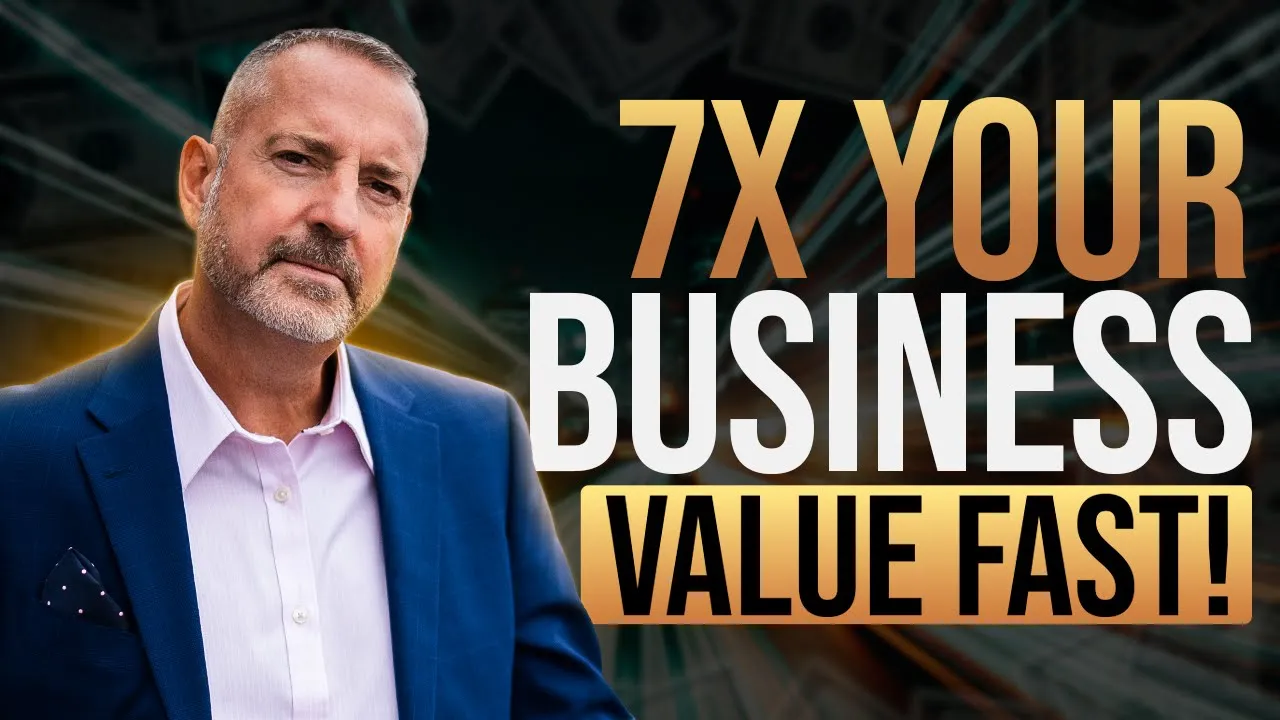Real-Estate Compared To Business Buying!
Real-Estate Compared To Business Buying!
Carl Allen shares insights on financing business acquisitions, likening the process to real estate transactions. He explains how deals are structured, covering essential aspects such as SBA loans, seller financing, and investor funding.
The acquisition process mirrors real estate transactions, involving finding a target, negotiating terms, securing financing, and finalizing ownership transfer. Buyers can leverage SBA loans, asset-based lending, seller financing, or investor partnerships to fund acquisitions. A standard SBA loan consists of 10% buyer equity, 80% SBA-backed financing, and 10% seller financing, often structured as deferred payments. Funds are deposited into escrow before ownership transfer, ensuring a seamless financial transition. Buyers must submit financial statements, tax returns, and legal agreements to lenders before securing funding. Once ownership is legally transferred, funds are released from escrow to the seller, covering liabilities and final costs.
Carl encourages dealmakers to engage with his content, subscribe, and ask questions to deepen their understanding of business acquisitions.
Full Transcript:
Dealmakers, what’s up?
My vision is to completely and utterly disrupt the market for buying and selling small businesses all over the world.
Morning, guys. Carl Allen. I’ve just been to see my drug dealer. I’ve just picked up my two, most favorite drugs. Well, the only two drugs actually that I take and I’ve ever taken, caffeine and sugar.
So the largest drug dealer in the world, Amazon. I’ve just been to see those guys, and I’m getting my, fix. And as you know, when I’m drinking my Starbucks on my way back to my office, I, consult you guys about some of the things that you wanna learn in the art and science of becoming a deal maker. So one of the questions that, you guys have been asking me on the YouTube channel, and again, guys, make sure you hit like and subscribe so you’re getting this content in real time as soon as I release it.
But one of the questions that you’ve been asking me is, Carl, how can you finance the acquisition of a business that you don’t own? How does the process work? And it’s a really interesting question. It’s a really valid question actually.
And it take it works exactly the same as a real estate transaction.
So you’ve all probably bought a piece of real estate.
So if you buy a piece of real estate, you go out, you find a real estate, whether it’s a house or it’s a multifamily type of deal, or or anything. So you you go and you buy the real estate, you go find it, you submit an offer, you negotiate the terms of the deal, and then once you’ve got an agreed offer, you then go out to, a financing.
So typically on real estate, you’ll have to put in a little bit of equity in some real estate deals.
I know because I’ve just done one. You can sell or finance, the equity portion. But generally, you’re putting down a little bit of equity. There might be some seller financing on the rest of the equity.
But the majority of the deal is gonna be debts. So you’re gonna go to a mortgage provider or a commercial lender and they’re gonna lend you that money. You might sub to, subject to the existing loan that’s in this in the real estate, but there’s gonna be some debt involved that you’re gonna be responsible, for paid. And you go out, you get the loan, and then what happens is the day before closing, the mortgage company will submit that money into escrow or into the lawyer’s, like client’s account.
So the money’s there. It’s safe. It’s ring fenced. And then you rock up to the office on closing day.
You sign the documentation which transfers the ownership of the house or whatever it is from seller to you as the buyer. And then the second that you’ve signed that paperwork all happens electronically now in a lot of cases. But as soon as you’re the legal owner of that house, then the money transfers from the escrow through to the seller’s lawyer. The seller’s lawyer will pay down the loan and then whatever’s left, whatever equity is lacking the house, that will go to the seller less any closing costs and fees, all those different things.
Right? So that’s how it works. Everybody understands that. Now buying a business works in exactly the same way, exactly the same way.
But It doesn’t matter what type of deal you’re doing. You might be doing an SBA deal. You might be raising money from investors. You might be doing asset based lending.
You might have a mix of closing payment, seller financing payments, earn outs, all those different things. But if we talk about the SBA example, because that’s more akin to you going to do a real estate deal, which you now understand. But on an SBA deal, what you would do is a typical SBA loan is ten percent buyer’s equity, which could be from you or from an investing partner that will come in with you on a deal. Eighty percent is the SBA loan, which as you know is at least seven to five percent government guaranteed if something goes wrong.
Now the final ten percent is a is a seller note, which can be paid, as a bullet payment after the SBA has been taken care of, or you can amortize that or cash flow that over say three years or five years or what happened. So in the exact same way you do real estate deal, you would go, you would find a business, you would negotiate price in terms of that deal. And then if you need a closing payment, you would go to the SBA or any of the lender.
You would give them all the information about the business, last three years of account, stack returns, latest balance sheet, you know, all their information that they might need, copy of the shelves, agreement, business plan, financial forecast, all that stuff. All lenders are different. So you send that stuff in and then they’ll give you a term sheet. So they’re gonna give a term sheet, which is basically their letter of intent, their LOI, that they’re gonna do the deal subject to due diligence.
They then go through the process of doing DD, legal DD, financial DD, commercial DD. They’ll obviously go through, the drafting of the legal contracts. So things like warranties and indemnities, all those different things. And then once everything’s kind of ticked off and everything’s ready to close, what then happens is, like with real estate, the day before the closing, the the bank, the SBA lender, they will wire that money into escrow.
So they’ll wire it into the lawyer’s escrow account or the lawyer’s client account. And then that money is held to order. That money is then ring fenced and can only be moved when you’re the legal owner of that business. So then you rock up to the lawyer’s office.
You’ll have agreed things like working capital to be left in the business.
You’ll have agreed whether you’re doing an asset deal or or a stock based deal. You’ll have agreed the handover period or whether the sellers, gonna stay on, to kinda help you. There are some kind of rules and nuances around that with SBA, so be careful with the seller wants to stay, that they’ll allow that. Generally, they don’t.
But, but you get them in and agreed, and then you will sign the documents. You’ll either DocuSign it if you’re remote, or you’ll rock up to the lawyer’s office, and you’ll sign the deal. Last SBA deal I signed, it was manually signed. I think I signed my name over a hundred and twenty times.
It was quite a complicated deal, and you’re signing in triplicate for the bank and triplicate for the SBA. It’s, yeah, an absolute nightmare. My my hand still doesn’t work properly.
I use almost all the ink from one of my Mont Blanc pens, because you guys know I signed deals with my Mont Blanc.
It was created it was a created deal. So you sign the documents, and then the second you’re the legal owner of that business, the money can then get released from escrow through the system to the seller. The seller will pay down any, liabilities that they’re gonna cover at closing. They’ll pay their closing cost, their fees to their lawyer, etcetera, their CPA, and then the balance of the money will will go to them.
So it’s exactly the same process as it is in real estate. So the question that was asked is how can you finance the acquisition of a business you don’t already own? The answer is that you can’t, but it happens back to back. It happens instantaneously.
The money is prepared. It’s put into escrow, so it’s safe. You then sign the documents to buy the business either manually or through a DocuSign or, or a PANDO service. And then the second that’s done, the money gets released, and the deal closes.
So that’s exactly how that works. So I hope you found that useful, but keep hitting me up, guys, with these questions. Keep asking me these questions inside of YouTube. So don’t forget to like.
Don’t forget to subscribe.
Show Uncle Karl some love. And then in the message in the chat box in the comments, type in if there’s a question that you have that I haven’t yet covered. I know absolutely everything there is to know about buying and selling businesses and growing businesses. So if you’ve got a question on your mind, like, wow, I I I wish Carl would speak to that, hit me up in the comment section.
I’m just going round a couple of horses, guys. Gotta go slow. You might see the horses in the rear view mirror, but, you know, I I love animals, and I’m going really, really slow. So I just go around.
Don’t mind whispering. They can’t hear me. I’m just going past these horses. But, guys, yeah, any questions that you’ve got on anything related to business or acquisitions, then definitely, tell me what is in the comments, and I will get those videos to you, very very quickly.
So I hope you find that useful. Have a great rest of your day. Go do some deals, and I will see you guys soon. Until then, bye for now.




